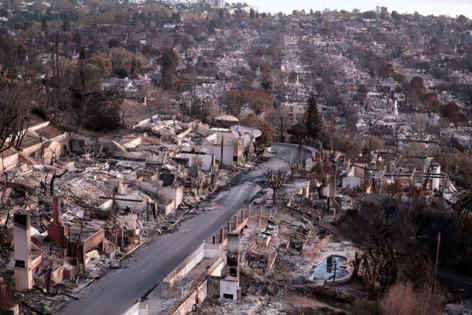Commentary: Tackling climate change must be job no.1
Published in Op Eds
Amid the historic and sweeping cuts to federal agencies and programs being carried out by the Trump administration, one truth has been overlooked: If we’re serious about cutting waste and protecting public funds, we must confront climate change head-on.
2024 was a disaster for the planet and its people. According to NASA, it was the warmest year since temperatures began being recorded in 1880. In the U.S. alone there were 27 climate and weather events that resulted in at least a billion dollars in damages — second only to 2023, with 28 such events.
These events — wildfires, floods, tornadoes and hurricanes — are becoming the norm, and they’re financially devastating.
In January, tens of thousands of acres and more than 16,000 structures burned in southern California. Last month, more than 150 tornadoes tore across the central and southeastern U.S. and, this month, historic floods submerged parts of the Midwest and South.
In the parts of the United States at higher risk for climate-related extreme weather events, insurance claims are increasing in cost and frequency. Not surprisingly, these high-risk areas are also now seeing the highest increase in cancellations for failure to pay premiums and nonrenewals by the insurance companies. Without insurance, homeowners may not be able to rebuild when disaster strikes.
And climate change isn’t the only escalating crisis. The world is also drowning in plastic. On Sept. 5, 2024 — Plastic Overshoot Day — the world exceeded its capacity to manage plastic waste. An estimated 220 million tons of plastic are projected to be produced this year alone, and 66% of people live in areas where plastic waste exceeds waste management capacity.
Meanwhile, new research shows just how dangerous plastics are to human health. Microplastics have been found in human brains, and the World Wildlife Fund estimates that we may be ingesting up to five grams of plastic each week — the weight of a credit card. Plastics are now linked to cancer, endocrine disruption, impaired fertility and cognitive development issues. Wildlife, too, is suffering from entanglement, starvation and habitat loss.
Here’s the hopeful part: We already have the tools and the power to change this. EARTHDAY.ORG, the network created by the original organizers of the first Earth Day in 1970, is still leading the charge with our campaign, “Our Power, Our Planet.” The goal is to help individuals, cities and communities act on the environmental challenges of today.
The economic upside of environmental action is massive. New solutions to our current environmental crisis rest in the hands of the people. This Earth Day, on April 22, you can exercise your power. Demonstrate to our leaders in government and business that we are still here, we are a witness to their actions and we will hold them accountable to do right by our planet and its people.
As consumers, we can choose plastic-free products and demand a reduction and transition in the use of plastics from businesses, while at the same time pressuring government leaders to reduce plastic production globally to end the use of toxic ingredients and to improve waste management systems.
We have the collective power not only to protect our planet but also to improve lives and livelihoods. The link between greenhouse gas emissions and climate change is now scientifically indisputable. According to the International Renewable Energy Agency, 90% of global electricity can and should come from renewable sources by 2050. The transition also promises cleaner air, up to 30 million new jobs and stronger energy independence.
Transitioning to clean energy, reducing plastic waste and increasing resilience to extreme weather are among the most fiscally responsible actions governments can take. This Earth Day, we must recognize that efficiency isn’t just about cutting — it’s about investing in solutions that protect people and our infrastructure. True government efficiency means reducing risk in order to cut costs — not paying billions each year to clean up after preventable disasters.
____
Susan Bass is senior vice president of programs and operations for EARTHDAY.ORG. This column was produced for Progressive Perspectives, a project of The Progressive magazine, and distributed by Tribune News Service.
___
©2025 Tribune Content Agency, LLC.




























































Comments